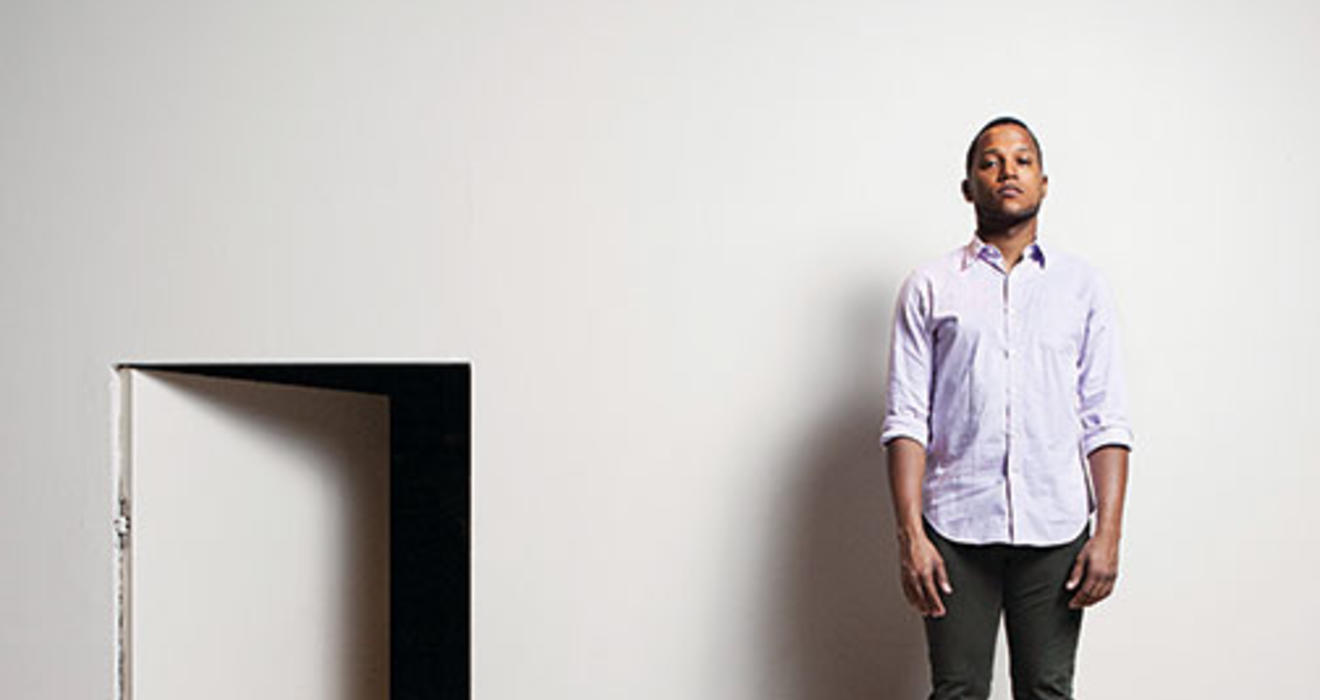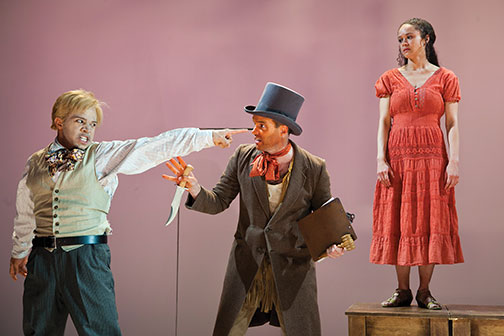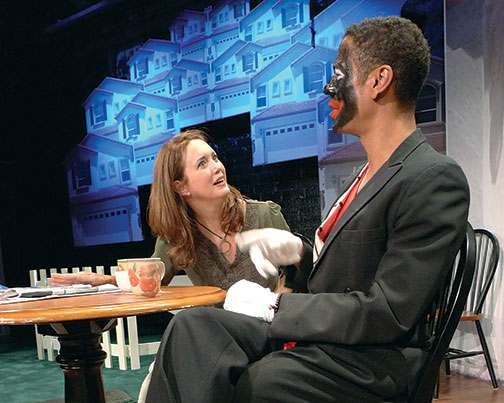
Not Black and White
If Branden Jacobs-Jenkins ’06’s plays make you uncomfortable, well, that’s the point
As the stage lights go up on Branden Jacobs-Jenkins ’06’s play, An Octoroon, they reveal a stage that is empty of actors but soon fills with ambiguity and ambivalence. A black man wanders out in his underwear. Though no one ever speaks his name, the script identifies him as “BJJ.” (Use your imagination.)
“Hi, everyone,” he greets the audience, “I’m a black playwright. I don’t know exactly what that means, but I’m here to make you feel something.”
With that vague charge, Jacobs-Jenkins and his doppelganger, BJJ, do just that, staging an adaptation of The Octoroon, an antebellum melodrama that played to large audiences in the United States and Europe in 1859. It is the story of Zoe, a young woman of one-eighth African blood (an octoroon, according to the racial classifications of the time), who must fend off the attentions of the plantation’s new owner and its former overseer. But Jacobs-Jenkins added a long prologue in which an African American actor playing BJJ, and a white actor playing Dion Boucicault, the Irish playwright who wrote the original Octoroon (also dressed only in his underwear), profanely wrestle with their anxieties and frustrations.
“Let’s just say that Mr. Jacobs-Jenkins turns self-consciousness into theater,” a New York Times reviewer wrote of the production, which ran off-Broadway in New York City last spring, “and that this is a lot more stimulating than it sounds.”
Boucicault’s treatment of race and class made his play controversial in its time, but in Jacobs-Jenkins’ version, racial classifications are not so much turned on their heads as tossed in the air like confetti. Black actors play white characters in whiteface and black characters in blackface. The white actor who plays Boucicault also puts on redface to portray an American Indian.
Jacobs-Jenkins embraces the melodramatic conventions — there is a moustache-twirling villain and a sighing heroine — but with blatantly modern twists, and nearly naked narrators are the least of it. When we first see the plantation, two slaves are sweeping great piles of cotton balls. They jaw like teenagers, discussing another slave who met someone “at a slave mixer over by the river before she dumped him because, you know, she couldn’t deal with the long distance.” Jacobs-Jenkins has fun with the odd juxtaposition. Stage directions read: “I’m just going to say this right now so we can get it over with: I don’t know what a real slave sounded like. And neither do you.”
The entire evening is a twist on identity. Racial classifications are at the play’s heart, but Jacobs-Jenkins wants us to go deeper. If smearing on a bit of makeup can transform a black person into a white person, what does that say about the malleability of racial identity? And what about authorial identity? While an actor played BJJ in last spring’s production, the real Branden Jacobs-Jenkins took an uncredited role as Br’er Rabbit, the figure from African American folktales who could outsmart less savvy animals. A gesture toward the durability of cultural heritage, perhaps, but in An Octoroon, the character was also an inside joke. Only a few friends were aware that Br’er Rabbit was Jacobs-Jenkins himself, wandering across the background of his own play in a bunny suit, never uttering a word.
“If you knew, you knew,” he says. “If you didn’t, you didn’t. I kind of liked it that way.”
So, apparently, did critics. An Octoroon received mostly favorable reviews during its three-week run at Soho Rep. Jacobs-Jenkins, The Village Voice said, “knocks us flat on our preconceptions.”
No one reads Macbeth and asks what Shakespeare meant to say about the nature of being Scottish. Only a pedant mines Our Town for insights into Thornton Wilder *26’s views on Protestantism in pre-war America.
But black playwrights, Jacobs-Jenkins observes, do not have the same luxury of writing universally. Everything they produce gets pigeonholed as a meditation on African American identity. At the start of An Octoroon, for example, BJJ complains that it is impossible for him to write anything “without someone trying to accuse me of deconstructing the race problem in America.” He continues: “I even tried writing a play about talking farm animals once — just to avoid talking about people — and this literary manager was like, ‘Oh my god! You’re totally deconstructing African folktales, aren’t you?’ I’m like, ‘No. I’m just writing about farm animals.’ And she’s like, ’No, no. You’re totally deconstructing the African folktales. That’s totally what you’re doing.’ ”
Jacobs-Jenkins likes to tell about the time he read one of his short stories aloud during a creative-writing seminar he took at the end of his sophomore year. After he had finished, the instructor asked, “One final question: What race are these people?” The question, Jacobs-Jenkins says, left him speechless. Why did it matter what race the characters were? Would a white writer have been asked the same question?
“Everything is always about race,” he acknowledges. “But only some of us get told that to our face. We don’t live in a color-blind world.” Nevertheless, Jacobs-Jenkins thinks those who try to inject racial meaning often do so lazily, and so he is determined to evade any easy classification. “When we say things are ‘about race,’” he insists, “we’re not saying anything.”
“I just don’t know how blackness onstage works,” he claimed in a May 2014 interview with playwright Eliza Bent for the Theatre Communications Group. “It’s just a thing that has always confused me. I don’t know what anyone is talking about when they talk about black theater, black drama, black actors. I don’t know. No one walks around saying ‘white theater’ or ‘white actors.’ I just want to understand.”
His plays both seek that understanding and challenge it. In Jacobs-Jenkins’ 2010 play Neighbors, a mixed-race family moves next door to a family of minstrel-show performers portrayed by black actors wearing blackface. Tapping the audience’s racial-sensitivity buttons with a sledgehammer, the minstrel-show family is named the Crows: Mammy, Zip, Sambo, Topsy, and — of course — Jim. The Times called it “one of the most sustained shocks of the theater season.”
Another Jacobs-Jenkins play, Appropriate, doesn’t contain any African American characters at all. A sweeping family saga a la Tennessee Williams, the play follows a white family that returns to the ancestral home in Arkansas, only to discover an album full of graphic lynching photos. We never learn where the photos came from or why anyone collected them, and even their meaning shifts from character to character and from scene to scene. Are they a record of brutality? A taproot of family history? A potentially lucrative piece of memorabilia? Or all of the above? Jacobs-Jenkins says he considers these two plays and An Octoroon to be “in conversation” with each other, exploring blackness and the question of how history operates in our lives.
His newest play, War, which is directed by his classmate Lileana Blain-Cruz ’06 and runs through Dec. 13 at the Yale Repertory Theater in New Haven, Conn., addresses many of the same questions of family, identity, history, and, yes, race. Nevertheless, it is a different kind of play for Jacobs-Jenkins, the first one he has staged that does not deliberately imitate a particular genre. “This is definitely a new iteration of the same investigation,” he says. “I feel like every time you answer a question, you’re asking another one.”
The questions are as important as any answers they might generate. Jacobs-Jenkins is uncomfortable with oversimplifications and seems determined to avoid sending his audiences home with matters neatly resolved and tied up with a bow. Most everything, he seems to say, depends on how you look at it.
Even the titles of his plays have double meanings. “Appropriate” is both an adjective, meaning fitting or proper; and a verb, meaning to use for one’s own purposes. Besides its obvious English definition, “war” is also the past tense of the German verb “to be.” And while Boucicault’s melodrama was titled The Octoroon, Jacobs-Jenkins called his adaptation An Octoroon, the subtle change signifying the impossibility of classifying anyone — and perhaps anything — with a definite article.
“I like that something can look like one thing but mean two different things,” he said in an interview for Vogue in April. “Language is really unstable in that way.”
The playwright says that his plays are not autobiographical, although he recognizes that it is an artist’s job to mine personal material and transform it. “A sculptor takes a rock and makes David,” he reasons. “As writers, our raw material is experience. On a basic level, I believe that’s always what I’m drawing on. I feel that I always start in places of anxiety and things I don’t understand. I’m always trying to answer them through the work.”
He had a sheltered, middle-class upbringing in a suburb of Washington, D.C. Jacobs-Jenkins’ mother was a lawyer, one of the first black women to graduate from Harvard Law School. His father was a dentist in the Maryland state prison system. They met, of all places, at an auction of segregationist artifacts. Jacobs-Jenkins recalls growing up amid their collection of “Whites Only” signs and Hattie McDaniel cookie jars, defanged and repurposed as kitschy art. He learned that objects can have a history that is both rich and complicated, a theme to which he has returned more than once in his work.
His grandmother, with whom he spent summers, wrote plays for her church in Arkansas — dark adaptations of Bible stories that toured to other churches. Jacobs-Jenkins acted in productions while in high school and recalls dragging his parents, when he was only 14, to see an all-black production of Waiting for Godot.
He had hoped to attend New York University, but after the 9/11 attacks his parents insisted that he apply to Princeton, a college he claims he only knew as the school Carlton Banks attended on the TV show Fresh Prince of Bel Air. He had never seen the campus before the day he moved in. Jacobs-Jenkins majored in anthropology but also was drawn to creative writing. Once he had taken every creative-writing class the University offered, his adviser suggested that he take a playwriting class taught by Robert Sandberg ’70, an award-winning playwright himself.
Sandberg worked his students hard, assigning them several plays to read and requiring them to write four short scenes of five to 10 pages each, as well as a one-act play of 30 to 50 pages. Even though Jacobs-Jenkins was a novice, Sandberg recalls his work as “absolutely astounding. Each of the plays he brought in was unique and fully formed,” exhibiting a native sense of theatricality. “He could create a whole world on stage.”
His plays spoke to his classmates, as well. When Jacobs-Jenkins read scenes aloud during their weekly meetings, he has recalled, “I could feel people paying attention, leaning forward.” After class one day, Sandberg told him, “I think you’re a playwright.”
Jacobs-Jenkins intended his thesis production — which Blain-Cruz, another of Sandberg’s advisees, worked on as lighting director — to be a full-scale examination of “black drama,” a response to everyone from August Wilson to Tyler Perry. According to a Daily Princetonian reviewer, the play, called “Heart!!!,” concerned “an African American boy with a heart problem and his life with his family of amputees.” A dying character was visited by the hair she had lost during chemotherapy, portrayed by an actor in a full-length hair suit. Looking back, Jacobs-Jenkins admits it was a mess: “The idea of sustaining someone’s attention for more than 15 minutes was like trying to climb a mountain for me.”
Sandberg, though, put his finger on a bigger problem. In addition to the thesis play, Jacobs-Jenkins had written an essay for the creative-writing program in which he tried to explain the work as a response to Wilson’s concept of “black drama.” Assessing the effort, Sandberg suggested that Jacobs-Jenkins had struggled because it was the first time he had overtly tried to address race in his work.
“Why didn’t you tell me this when I was crying on your couch every week?” he recalls thinking. In retrospect, Jacobs-Jenkins says, he realized that Sandberg was right, adding: “I owe my whole career to him.” Sandberg’s observation ultimately made him understand that questions of identity are central to any family’s history and that race is often a touchstone of identity.
After Princeton he studied performance art at NYU (he later dropped out), and began experimenting with blackface and minstrelsy. He returned to the ideas he had started to explore at Princeton and wrote Neighbors, approaching it, he once said, intending to put “every single thing I can possibly know, think, or feel about [race] into this one play.” His production was a sensation, but the reviews were mixed. Charles Isherwood panned it in the Times as “simultaneously overheated and undercooked,” and blasted its “flame-throwing dramaturgy.”
Appropriate, produced nearly four years later, moved in the other direction. Though the play is an almost Faulknerian tale of a family’s attempt to escape the dead grip of the past, Jacobs-Jenkins also set out to explore whether he could make race invisible while still letting it dominate the play emotionally. “At what point does my play not become ‘black drama,’” he asks rhetorically, addressing invisible critics. “Do I have to put an all-white cast on stage? Is it still a black drama? What does that mean?”
Race can make us uncomfortable, but Jacobs-Jenkins wants us to be uncomfortable, to react and then examine our reactions. At the end of one scene in Appropriate, for example, a boy comes downstairs after rummaging around in the attic, innocently wearing his late grandfather’s Ku Klux Klan hood. The other characters are horrified, and so are we, but the scene is so outrageous that it is played for laughs. We know there is nothing funny here, but we can’t help ourselves and that, Jacobs-Jenkins believes, is what makes our reactions interesting.
Blain-Cruz believes that a key to Jacobs-Jenkins’ success is his ability to keep the emotional ground shifting beneath the audience’s feet. “In a state of unease, you can also laugh,” she says. Large dramatic gestures, whether they be a boy in a Klan hood, slaves who sound like Valley Girls, or neighbors who burlesque the most grotesque racial stereotypes, keep the plays “alive as theater. Whenever I’ve walked out of a piece of Branden’s, I feel electricity in the audience.”
Sandberg agrees. “He’s certainly asking questions about race in American society,” he says. “He continually takes risks that go beyond the mainstream, but he also grounds his plays because he is dealing with characters, relations, and emotional arcs that are accessible to a broader audience.”
In late October, just three weeks before War was due to premiere in New Haven, Jacobs-Jenkins still was tinkering with the script. This is a bad habit, he confesses, quoting Paul Valéry, who once said that “poems are never finished — just abandoned.” There is more to it, of course. “I think that because I start my work with so many open questions I’m trying to answer, I never quite feel that I’ve answered them satisfactorily,” he says. “I’m always chipping away at them.”
War might be Jacobs-Jenkins’s most ambitious work yet. It concerns an older black woman who is in a coma while her two children argue about how to care for her. They learn that their mother has been hosting two other relatives they did not know about: a half-sister conceived by their father while he was a serviceman in Germany, and her son. Racial classifications again fly through the air; several of the characters are black, one is half black, another is a quarter black. Who is black? the playwright asks — and why does it matter?
There is much more to War, though, just as there is in Jacobs-Jenkins’ other works. Large parts of the first act take place inside the matriarch’s subconscious as she lies in her hospital bed. Family members appear in her thoughts as apes. Over the course of the play, the characters communicate in three languages: English, German, and sign language.
If An Octoroon was complicated, there is an equally tricky makeup problem to be addressed in this play. Putting the actors in gorilla masks or even dramatic face paint would risk turning it into a Planet of the Apes knockoff. Instead, director Blain-Cruz and Jacobs-Jenkins decided that the actors would wear normal makeup throughout the play and portray the apes entirely through posture and body movement.
There will be more questions — some more difficult than makeup and stage direction — but those looking for simple answers are likely to be disappointed. “He’s too smart to say, ‘This is what race is,’” Blain-Cruz argues. The subject is too complicated, too deeply woven into the fabric of our society. What makes Jacobs-Jenkins’ plays so provocative, she believes, is that “he makes the audience work. It’s about never letting us be comfortable, never allowing us to occupy a place of feeling like we know it all — because we don’t.”
Mark F. Bernstein ’83 is PAW’s senior writer.








1 Response
Al Lowe ’70
10 Years AgoA Playwright’s Life on Campus
Reading Mark Bernstein ’83’s article about Branden Jacobs-Jenkins ’06’s plays (cover story, Dec. 3) not only made me proud to be an alumnus of Princeton, but also quite excited about the prospect of seeing his work on stage. I would also be highly interested in seeing Mr. Jacob-Jenkins’ take on attending Princeton. In his song, “Black or White,” Michael Jackson wrote: “I’m not going to spend my life being a color,” but perhaps it would be intriguing to find out what it’s like to spend four years of one’s life being ... black and orange.